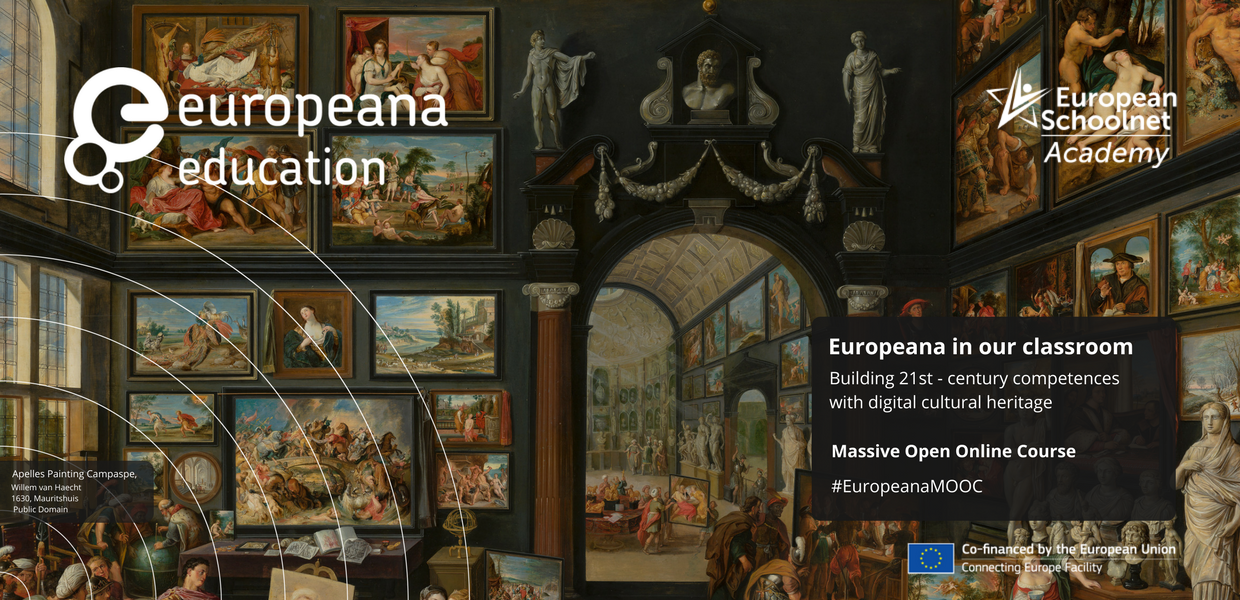First Europeana Education MOOC: Giving teachers confidence to use digital cultural heritage
The first Europeana Education MOOC, ‘Europeana in your classroom’, delivered by European Schoolnet (EUN), ran between 30 April – 15 June 2018. The course introduced participants to the Europeana platform to help them build learning scenarios using digital culture and fostering the 21st-century skills.

- Title:
- Apelles painting campaspe
- Creator:
- Willem van Haecht
- Date:
- 1630
- Institution:
- Mauritshuis
- Country:
- The Netherlands
- Copyright:
- Public Domain
Over 6.5 weeks and five modules, the course offered tested classroom activities using 1) a range of educational resources produced by the Developer Group (DG), and 2) a range of Europeana tools and resources (Europeana collections, curated datasets or apps among others).
‘Europeana in your classroom’ course content
Students learnt:
1) Why it is important to integrate European cultural heritage in education.
2) How to use Europeana Collections to teach their subjects.
3) How to navigate the Europeana Collections website.
4) How to explore and familiarise themselves with the various Europeana apps, tools and materials.
5) How to build learning activities using Europeana Collections resources.
Over 2,000 registrants from 59 countries
To evaluate the success of the MOOC, EUN compiled data from two sources: (1) course registration and participation (started/completed); and (2) data collected via two surveys completed voluntarily by participants before and after the course. The surveys provided information about the profile of course participants, their motivations for joining the course, and the participants’ course impressions and satisfaction.
‘Europeana in your classroom’ got a high number of registrants (2,019 people) from 59 different countries across the globe, which indicates a clear interest in integrating digital cultural heritage in education. The course also had a satisfactory engagement rate of almost 50% (990 participants) and a completion rate of 35% (342 participants), exceeding the MOOC average of 10%.
Participant Map. Schoolnet Academy. CCO
Data collected via pre-course surveys (n=719) indicates that the majority of course participants are secondary school teachers (60%), and female (82%). 70% of participants are over 36 years old. Among their main motivations to participate, bringing innovation into their practice came out top.
Feedback from happy teachers
The post-course survey results (n=271) showed that more than 95% of survey respondents rated the overall value of the course as ‘Good’ or ‘Very good’. 95% of the survey respondents also ‘Agreed’ or ‘Strongly agreed’ that the course has made them more confident in using digital cultural heritage in their classroom and that they would recommend this course to a colleague or friend. A large number of posts on the Facebook group page shows the satisfaction of the participants. Some of them said:
Thank you European Schoolnet Academy and to all my peers! I had such a wonderful adventure, learning and exploring from the very beginning to the end of this course!! Mirela. Mela Price (3 July)
Thank you Academy, moderators and all of the involved teachers for a great experience in this course!! Best wishes from Orhaneli-Bursa/Turkey, have a nice holiday! Esra Demirhan Eroğlu (26 June)
What’s next?
Teachers also had the opportunity to suggest improvements for future editions of the course and there was a clear consensus for finding more translated material and more practical examples.
In order to include their suggestions and continue exploiting the clear benefits of the course, the MOOC developed during Europeana DSI-3 will be updated by incorporating the learning scenarios produced throughout the DSI-4 period, and run twice in English (January 2019/January 2020). Additionally, the MOOC will be translated and run in two additional languages in 2019 and two further languages in 2020.
Find out more
If you are interested in the course and don’t want to miss the next editions, follow our news and updates by joining our Europeana Education Community.

